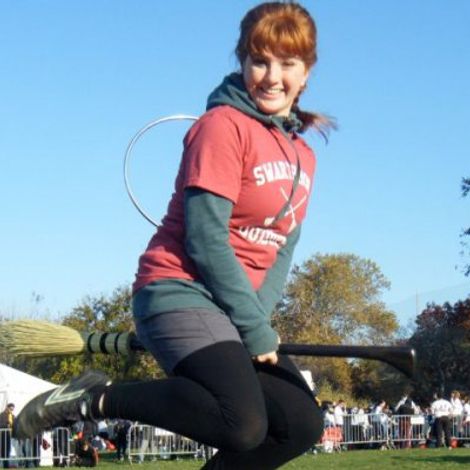University of Ottawa Quidditch Team





The grant this month goes to Clare Hutchinson and the University of Ottawa Quidditch team! Clare helped start the team at uOttawa, which is based on the sport written by J.K. Rowling in the Harry Potter book series, a sport played by over 300 teams globally. The sport uses and adapts rules from the book to a Muggle (non-magical) context. Bringing people together from all backgrounds at uOttawa, from the athletic to the non-athletic and the engineering students to the arts students, playing Quidditch helps the students stay healthy and active all year long.
The game was started by some students at Middlebury College in Vermont in 2005 as an alternative to their regular games of bocce. Alexander Manshel was the first Quidditch Commissioner and he was the one to adapt the rules from the stories to a real life game. Alex Benepe took over that role and really took the game from just being intramurals played at Middlebury to the international sport it is today (he is still the Commissioner of the International Quidditch Association). By 2008, teams travelled from across the United States to compete in the Quidditch World Cup, including a single Canadian team, McGill University. Last year 96 teams competed on Randall’s Island in New York City.
The version of Quidditch played at uOttawa is extremely close to the version Harry Potter plays. Three Chasers on each side attempt to score on the opposing team’s hoops (of which there are 3) with the Quaffle (a slightly deflated volleyball). The hoops are guarded by a Keeper, who generally plays offensively as well. This part of the game is quite similar to rugby. The Beater position reflects the challenges a player would face on a broomstick. There are 2 Beaters on each side, and 3 Bludgers (dodgeballs); when a player gets hit by a Bludger, they must drop whatever they are holding and run back to their side of the field and touch the hoops before they remount their broom and rejoin the game; this is a time penalty that simulates falling off a broom.
A goal is worth 10 points, and a Snitch Snatch is worth 30. The game is full contact and co-ed (current gender rules stipulate that there must be 2 players of the opposite gender on the pitch at all times; soon, it will change to a ratio of 3:4). There are rules against back-tackling and illegal tackles, but the game can still get rough, and injuries (known as “quinjuries”) are common, as no protective gear is worn during play. Because there are 4 balls and 4 positions with different rules for each, there is a lot going on, and goal referees and bludger referees are often used.
In Clare’s words: “My favourite adaptation is by far the Snitch. In Muggle Quidditch, the Snitch is a person. And just like the Snitch in the game, they are playful, unpredictable, and extremely difficult to catch: Snitches have a ballsock on the back of their shorts that must be caught by either team’s Seeker to end the game. Snitches are released at the beginning of the game and have full run of the area, although they must return to the pitch at a certain time. Amid all the running and wrestling (Snitches cannot be tackled, although they can tackle other players), Snitches like to entertain the crowd with acrobatics, climbing trees, throwing snowballs or water balloons, bullfighting, and general tomfoolery. All players except the Snitch (who has no broom) must be on their brooms at all times.”
There are about 600 registered Quidditch teams worldwide; uOttawa’s team plays year-round, although some teams have on- and off-seasons. While the World Cup is generally the only time that most Quidditch teams come together, there are numerous regional tournaments held throughout the year all over the world. uOttawa Quidditch is quite new in the scheme of things, at just over a year old, but they’ve already become well-known for their team spirit, gorgeous uniforms, and obnoxious cheering (accompanied by a signature snare drum and war dance).
Clare and team hope to use the funds to help students who are financially disadvantaged to accompany them to away tournaments and to host more tournaments in Ottawa to spread Canadian Quidditch culture.